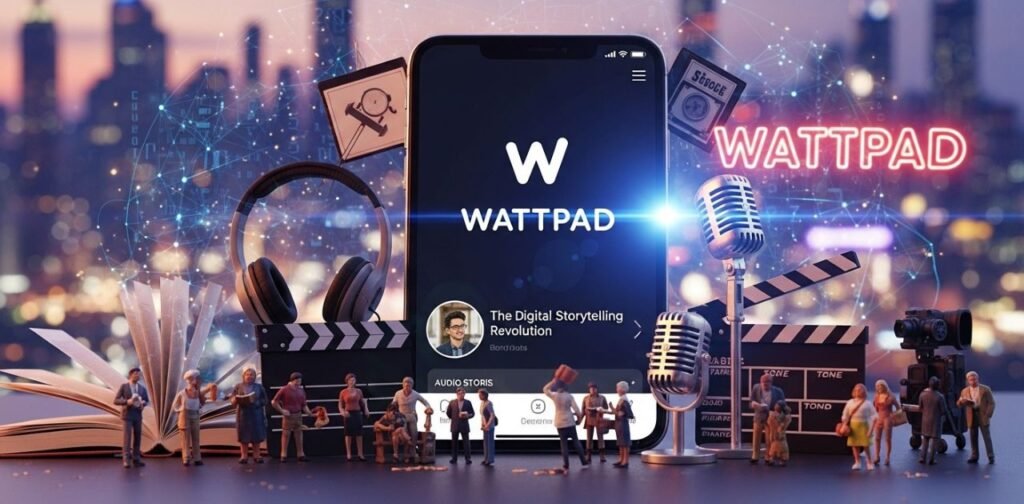Introduction
In the vast digital landscape, where attention spans are short and content is king, a quiet revolution has been unfolding in the world of literature. Wattpad, a name derived from “watt” (as in a unit of storytelling power) and “pad” (as in a notebook), has grown from a humble app into a global cultural phenomenon. It’s more than just a website or an app to read free stories; it’s a vibrant, dynamic ecosystem where aspiring writers and avid readers converge to create, share, and discover narratives that often defy traditional publishing conventions. This platform has democratized storytelling, broken down barriers to entry for writers, and become a formidable force in identifying what resonates with the next generation of audiences. It’s where tomorrow’s bestsellers and blockbuster movies are often born, nurtured not by editors in skyscrapers, but by millions of passionate fans voting with their comments and clicks. This article delves deep into the Wattpad universe, exploring its mechanics, its monumental impact, and its future trajectory.
What is Wattpad? Deconstructing the Platform’s Ecosystem and Core Mechanics
At its most fundamental level, Wattpad is a social storytelling platform. Founded in 2006 by Allen Lau and Ivan Yuen, its initial goal was to create a space where anyone with a story to tell could share it with a mobile-first audience. The core premise is elegantly simple: writers post their work—chapter by chapter—and readers access it for free on their smartphones, tablets, or computers. However, to label it merely as a free online library is to miss its entire essence. Wattpad’s true innovation lies in its deeply integrated social components. Unlike a traditional book, a story on Wattpad is a living, breathing entity. Readers can comment on specific paragraphs, lines, or even words, creating a live, granular reaction that writers can see in real-time. They can vote on chapters, adding a quantitative measure of engagement, and they can directly message their favorite authors. This transforms the solitary act of reading into a communal experience and turns writing into an interactive process.
This ecosystem is powered by a sophisticated algorithm, not unlike those used by Netflix or Spotify. The platform’s discovery engine recommends stories to users based on their reading history, what they’ve voted on, and what’s trending within their followed communities. This allows niche genres—from fanfiction about K-pop idols to supernatural romance involving werewolf packs—to thrive and find their dedicated audience. For writers, this provides invaluable, immediate feedback. They can gauge which plot twists landed, which characters are beloved, and which chapters dragged, allowing them to refine their craft and their story in a way that was previously impossible. This “data-driven storytelling” is a double-edged sword; while it creates incredibly engaging content tailored to audience desires, it can also sometimes lead to formulaic narratives. Nonetheless, it represents a seismic shift from the top-down curation of traditional publishing to a bottom-up, community-driven model where popularity is the primary currency. The platform’s business model, which includes advertising, a premium subscription service (Wattpad Premium) for an ad-free experience, and its Paid Stories program where top writers can earn direct revenue, ensures its sustainability while keeping the vast majority of content accessible to all.
The Wattpad Effect: How a Digital Community is Reshaping Publishing and Entertainment
The “Wattpad Effect” is the tangible impact the platform has had on the broader creative industries, proving that its community’s taste is a powerful predictor of mainstream success. Wattpad Studios and Wattpad Books are the formal arms of this influence, actively scouting the platform’s top-performing stories for adaptation and publication. This has created a new, viable pathway to a writing career. Authors like Anna Todd started writing After, a One Direction fanfiction, on her phone. The story amassed over a billion reads, leading to a multi-book deal with Simon & Schuster, a major motion picture franchise, and translations into numerous languages. This story is not an anomaly; it’s a blueprint. Beth Reekles’ The Kissing Booth, Ali Novak’s My Life with the Walter Boys, and many others followed similar paths from digital serial to global sensation.
This model de-risks the traditional gamble of publishing and film production. Instead of investing millions in marketing to create an audience for a new property, studios and publishers can now option stories that already have a proven, built-in, and highly engaged fanbase. This fanbase doesn’t just represent sales; it’s a ready-made marketing army that will eagerly promote the adapted work. Furthermore, Wattpad has diversified the voices in mainstream media. It provides a platform for writers from marginalized communities and those writing stories that traditional publishers might have deemed “too niche” to find their audience and prove their commercial viability. The data Wattpad collects—what genres are rising in which regions, what character archetypes are resonating—is a goldmine for understanding global youth culture. The platform’s influence extends beyond its own borders, shaping trends in young adult literature, romance, and science fiction, and forcing the entire industry to pay attention to the democratized, serialized, and social future of storytelling.
A Creator’s Guide: Strategies for Building a Successful Presence and Audience on Wattpad
For an aspiring writer, succeeding on Wattpad requires more than just uploading a manuscript. It demands strategy, engagement, and an understanding of the platform’s unique culture. First and foremost is consistent, serialized content. The algorithm favors activity, and readers crave regularity. Posting a complete novel all at once is a recipe for obscurity; instead, writers should establish a reliable schedule (e.g., a new chapter every Tuesday and Thursday) to build anticipation and maintain a position in readers’ update feeds. Secondly, mastering the metadata is crucial. This includes a catchy, genre-appropriate title, an eye-catching cover (often created by talented designers within the Wattpad community), and a compelling blurb that hooks the reader immediately. Using relevant tags (LSI keywords like #teenfiction, #urbanfantasy, #slowburn romance) is essential for discoverability, helping the algorithm connect your story to the right readers.
However, technical strategy is worthless without genuine community engagement. This is the heart of Wattpad. Successful writers don’t just post and disappear; they respond to comments, ask readers questions, and participate in community forums. They might run polls to let readers decide on a character’s decision or a cover design, fostering a sense of co-creation. Reading and meaningfully commenting on other stories in your genre is also a key networking strategy. Building a loyal following on Wattpad is a marathon, not a sprint. It’s about writing a story you are passionate about, interacting with every person who takes the time to engage with it, and slowly cultivating a dedicated fanbase that will vote, comment, and champion your work, ultimately signaling to the algorithm that your story is worth promoting. For those who crack the code, the rewards extend beyond fame; the Wattpad Paid Stories program allows writers to earn a direct share of revenue from their work, providing a financial incentive and validating writing as a legitimate profession.
Frequently Asked Questions (FAQs) About Wattpad
1. Is Wattpad really free to use?
Yes, the vast majority of Wattpad is free for readers. The platform is supported by ads that appear between chapters. However, Wattpad also offers a premium subscription service called Wattpad Premium that removes ads and provides access to some exclusive bonus content. Additionally, the Paid Stories program allows top writers to lock later chapters of a story behind a paywall, with revenue shared between the writer and Wattpad.
2. Can anyone write on Wattpad?
Absolutely. Wattpad is designed to be an open platform for writers of all skill levels. You simply create a free account and can start publishing your story immediately. The community is made up of everyone from first-time writers experimenting with ideas to established authors building an audience.
3. Do writers on Wattpad own the rights to their own stories?
Yes, unequivocally. Wattpad does not claim ownership of the original content you post. You retain all copyright and intellectual property rights to your work. Wattpad’s terms of service only require a license to host and display your content on their platform.
4. How do writers make money on Wattpad?
There are several avenues: through the Paid Stories program, where they earn a share of revenue from locked chapters; by winning contests often sponsored by brands or Wattpad itself; by getting discovered and landing a traditional publishing deal; or by having their story optioned for film/TV adaptation through Wattpad Studios.
5. What are some common criticisms of Wattpad?
Common critiques include concerns over content quality, as the open nature means there are many unedited works; issues with plagiarism and story theft; the potential for stories to become formulaic as writers cater to algorithm-friendly trends; and the presence of mature content that some feel is too easily accessible to younger teens.
6. How does Wattpad handle mature content?
Wattpad has a rating system, and writers are required to tag their stories appropriately (e.g., Mature). Stories rated for mature audiences are placed behind an age gate and require users to confirm they are 17 or older to read them. The platform also uses a mix of human moderators and AI to enforce its content guidelines.
7. Is Wattpad just for romance and fanfiction?
While those are two of the most popular and visible genres on the platform, Wattpad hosts a massive variety of genres. You can find high-quality science fiction, mystery, horror, poetry, LGBTQ+ literature, non-fiction, and more. The tagging system makes it easy to explore beyond the most mainstream trends.
Conclusion: The Future of Storytelling is Social
Wattpad’s journey from a niche app to a cultural powerhouse is a testament to a fundamental human truth: we crave connection through story. It has successfully modernized the ancient art of serialized storytelling for the digital, mobile age, proving that the audience doesn’t just want to consume stories passively—they want to participate in them. They want to theorize in the comments, cheer for their favorite couple with votes, and have a direct line to the creator. Wattpad’s model has fundamentally challenged the ivory tower of traditional publishing, creating a more meritocratic (though not without its own flaws) system where success is driven by resonance rather than just connections.
Looking forward, Wattpad’s trajectory seems focused on deepening its two core strengths: data and adaptation. Its parent company, Naver Webtoon, is a leader in digital comics, suggesting potential for deeper cross-platform storytelling and adaptation. The data Wattpad gathers will become even more valuable, potentially offering hyper-specific insights into global storytelling trends that could guide the entire entertainment industry. We can expect more sophisticated monetization tools for creators, further blurring the lines between amateur and professional. However, the biggest challenge will be balancing growth with quality and community safety. As it scales, maintaining the intimate, engaged feel that made it successful will be crucial.
Ultimately, Wattpad is more than a platform; it’s a paradigm shift. It has redefined the author-reader relationship, democratized the path to publication, and become an indispensable incubator for the intellectual property of tomorrow. It has shown that the future of storytelling is not solitary but social, not static but serialized, and not top-down but community-built. For anyone with a story to tell or a love for discovering new worlds, Wattpad has undoubtedly secured its place as a foundational pillar of 21st-century literature.



